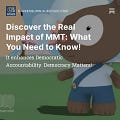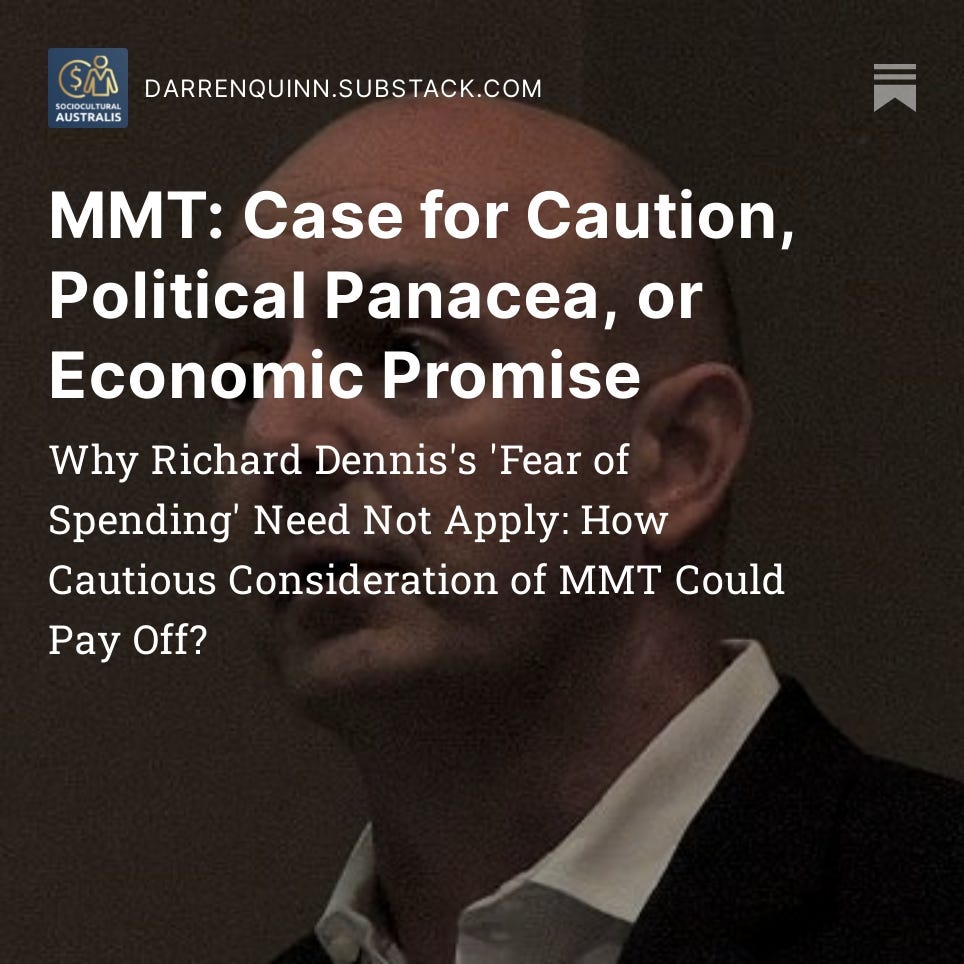Engaging Rebuttals to Economic Misconceptions
In this series of compelling articles, Darren Quinn offers a comprehensive exploration of Modern Monetary Theory (MMT), its implications, and its potential role in shaping our economic future. Through each piece, Quinn engages in a dynamic dialogue with various economic perspectives, shedding light on the revolutionary aspects of MMT and its transformative potential for democratic, economic, and societal change.
From illuminating the intersection of democracy and economics, countering arguments from Austrian economists, to challenging assumptions made by mainstream economists and think tanks, Quinn's responses provide a robust defence of MMT. He further underscores the relevance of MMT in progressive economic thought, arguing that it can coexist with capitalism and fund innovative policies without causing inflation.
In responding to various critiques, Quinn also clarifies the principles of MMT, such as the strategic use of taxes, the non-existence of 'free lunches' in full resource-utilized scenarios, and the importance of real resource availability over arbitrary financial limits. He also addresses the concerns of inflation and financial crises, asserting that these issues often stem from inadequate regulation and resource mismanagement rather than MMT principles.
Most notably, Quinn emphasizes the need to shift our obsession from financial deficits to societal deficits such as job shortages, environmental issues, and affordable housing. By doing so, he advocates for a version of MMT that prioritizes societal needs and real-world constraints over monetary ones.
Join Darren Quinn in this thought-provoking journey as he navigates the complex terrain of economic theory and policy, providing fresh insights and challenging conventional wisdom. Whether you're an economist, policymaker, or just a curious reader, these articles offer a fascinating exploration of MMT and its potential to reshape our economic future.
The Intersection of Democracy and Economics: An MMT Response to Adam Triggs
This article challenges conventional economic beliefs and reveals MMT's role in redefining government spending, unemployment, and inflation control.
Uncover the empowering potential of Modern Monetary Theory in democratizing financial systems in Darren Quinn's riveting response to Adam Triggs.
MMT Enhances Democratic Accountability
MMT, A Revolutionary Perspective: My MMT Response to John Quiggin
This article takes you through MMT's radical reimagining of government spending, taxation, and inflation control and its implications for economic policy and societal change.
Dive into Darren Quinn's enlightening counter-argument to John Quiggin. Discover how Modern Monetary Theory could be the beacon of hope for our monetary future.
Is MMT a Political Risk? A Response to Richard Denniss
This article emphasises the need for responsible spending to avoid inflation and acknowledges the ongoing debate about the appropriate limits of MMT's application.
Is Modern Monetary Theory the political panacea we've been waiting for? Darren Quinn's thought-provoking response to Richard Denniss invites you to explore this critical question.
MMT: Case for Caution Or Economic Promise?
Navigating Progressive Economics Beyond Communism: A Response to Honi Soit
The content of this article argues that the profit-seeking dynamics of capitalism do not inherently preclude the successful implementation of MMT and a Green New Deal. Quinn emphasizes the need to assess the feasibility of policies based on their merits and real-world experience rather than relying on theoretical assumptions. He suggests that MMT when applied responsibly, can fund progressive programs without causing inflation, a common concern among critics. The article advocates for policy ingenuity and experimentation in addressing sustainability and equality challenges, emphasizing the importance of continuous feedback and adaptation. Quinn suggests that the focus should be on the potential efficacy of reforms rather than presupposed limitations.
Can Modern Monetary Theory chart a course beyond communism? Darren Quinn's intriguing response to a communist critique invites you to explore this fascinating debate.

Modern Monetary Progression Without Communist Preclusions
Defending MMT: A Counter to Austrian Assertions
Darren Quinn's 'A Response to Fabian Wintersberger' defends Modern Monetary Theory (MMT) against criticism. Quinn emphasizes MMT's understanding of the interplay between deficits, inflation, and supply shocks. In response to Anders Bylund's critique of MMT's tax-driven theory of money, Quinn states that taxes are not the sole source of currency value but a critical component.
He refutes arguments using Argentina's high inflation as an example, explaining that macroeconomic imbalances complicate the situation. Quinn clarifies that MMT sees the government as a tool to achieve economic and social goals, not an omnipotent entity. He advocates for MMT as a fresh perspective that challenges traditional economic assumptions and encourages ongoing discussion to refine economic understanding.
Challenging the classics: Darren Quinn's Modern Monetary Theory response to Austrian economists sparks a bold conversation. Dive into the riveting dialogue now.
A Response to Fabian Wintersberger
Unravelling the Fabric of Modern Money: Multiple MMT Responses to the Grattan Institute
Quinn demystifies Modern Monetary Theory (MMT) and addresses misconceptions propagated by mainstream economists.
He emphasises two key principles underpinning MMT:
Governments fund spending not through taxes or debt but by creating money as needed. The notion of required 'fundraising' before spending is a self-imposed myth, with taxes and regulations being tools to control inflation rather than necessities for financial operation.
The affordability of policy goals is determined by real resources available, not arbitrary financial limits. If labour and materials are available for public purposes, money creation, when monitored for inflation, can achieve these purposes without causing societal doom, as is often claimed.
Dive into Darren Quinn's engaging responses to The Grattan Institute. Uncover the truths behind the Emperor's New Clothes in the context of Modern Monetary Theory.
The Truth Behind the Emperor's New Clothes
Green MMT, Sustainable Prosperity: A Response to Ben Oquist
Quinn agrees with the need for tax reform in Australia but stipulates that MMT does not advocate for the abandonment of taxes. Instead, it underscores the strategic use of taxes to regulate the economy, prevent inflation, and promote social justice.
Intrigued by the connection between taxation, sustainability, and a greener economy? Darren Quinn's response to Ben Oquist offers a fresh MMT perspective that might change the way you think about tax reform.

An Abundance of Free Lunches Unmasked: An MMT Response to Ross Gittins
Quinn argues that at the societal level, the concept of "no free lunch" applies only when all resources are fully and appropriately utilised. He points out a flaw in the current economic paradigm, which treats money as a scarce resource rather than focusing on real resources.
Is there such a thing as a free lunch in economics? Darren Quinn's compelling response to Ross Gittins stirs up fascinating discussions on production possibilities from an MMT perspective. Click on the image below.

Macroprudential Tools and Their Impact: Another MMT Response to Ross Gittins
Quinn begins by correcting a common misunderstanding that MMT advocates for monetising deficits, i.e., using government securities to "fund" the deficit. He clarifies that this is not the case and explains that the exchange of bonds for credits in exchange settlement accounts is not money creation but a swap of one interest-bearing monetary instrument for a non-interest-bearing monetary instrument.
Addressing the issue of financial crises, Quinn suggests that they are typically not a result of MMT's principles but rather stem from inadequate regulation. He notes that risky arbitrage arrangements made by competing banks, which involve borrowing short-term and lending long-term, contribute to financial instability.
Join Darren Quinn as he explores the potential of macroprudential tools to prevent financial crises in his second response to Ross Gittins. It's a fresh take on economic stability you won't want to miss. Click the image below.

Beyond Debt, The Importance of Real Deficits: My MMT Rebuttal to Holden, Edmond and Preston
Quinn rebuffs the idea that MMT disregards budget deficits. Citing MMT economist Stephanie Kelton, he emphasizes the importance of addressing deficits like job shortages, environmental issues, and lack of affordable housing. He clarifies that a government budget deficit essentially translates into a private sector surplus.
Quinn criticises the common analogy of government spending as a household budget, highlighting the fact that government spending often precedes taxation and borrowing. He also discusses the inflation constraint, explaining that actual resource availability is the real constraint.
Quinn acknowledges that inflation can occur before full employment, citing current situations like the coronavirus pandemic and the Russia-Ukraine conflict as examples. Finally, he advocates for focusing on addressing societal needs, arguing that careful resource management and expanding domestic production can help minimize inflation risks. The article champions a version of MMT that prioritizes societal over financial deficits.
Discover a unique take on the debt obsession that dominates economic discourse in Darren Quinn's insightful response to Edmond, Holden, and Preston.








